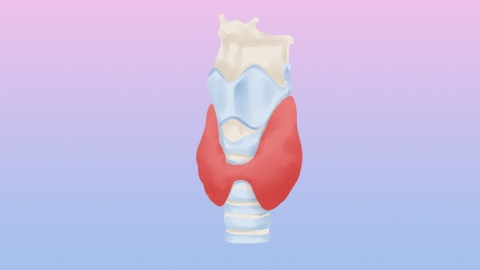Why do patients with chronic thyroiditis experience hoarseness?
Hashimoto's thyroiditis usually refers to chronic thyroiditis. Generally, chronic thyroiditis patients experiencing hoarseness may be caused by mild thyroid enlargement, sensitivity of the pharyngeal mucosa, significant thyroid enlargement compressing the recurrent laryngeal nerve, concurrent laryngeal inflammation with thyroiditis, thyroid fibrosis, and other reasons. If hoarseness persists or worsens, it is recommended to seek timely treatment at a reputable hospital. Detailed analysis is as follows:
1. Mild Thyroid Enlargement
Chronic thyroiditis can cause chronic inflammatory reactions in the thyroid tissue, which may lead to mild enlargement in the early stages. Although it may not directly compress nerves, it can slightly irritate surrounding tissues, affecting normal laryngeal function and causing hoarseness. It is important to avoid excessive voice strain and reduce prolonged loud talking or shouting in daily life.
2. Sensitivity of Pharyngeal Mucosa
Some patients with chronic thyroiditis may have inherently sensitive pharyngeal mucosa. Inflammation might extend to the throat area through adjacent tissues, causing congestion and swelling of the pharyngeal mucosa, affecting normal vibration of the vocal cords and resulting in hoarseness. Drinking more water to keep the throat moist and avoiding dryness is recommended. The diet should be light, avoiding spicy and irritating foods such as chili peppers and garlic.

3. Significant Thyroid Enlargement Compressing the Recurrent Laryngeal Nerve
Significant thyroid enlargement may directly compress the recurrent laryngeal nerve. This nerve controls vocal cord movement, and when compressed, it can restrict vocal cord mobility, causing noticeable hoarseness. Medications such as levothyroxine sodium tablets, methimazole tablets, and propylthiouracil tablets should be used under a doctor's guidance to regulate thyroid function and reduce enlargement.
4. Concurrent Laryngeal Inflammation with Thyroiditis
Patients with chronic thyroiditis often have relatively low immunity, making them susceptible to bacterial or viral infections that can lead to laryngeal inflammation, such as laryngitis. Laryngeal inflammation can cause vocal cord congestion and swelling, impairing voice production and causing hoarseness. The type of infection needs to be identified, and if bacterial infection is present, antibiotics such as amoxicillin capsules, cefuroxime axetil tablets, and azithromycin dispersible tablets can be used under a doctor's guidance.
5. Thyroid Fibrosis
Long-term recurrent chronic thyroiditis can lead to progressive fibrotic changes in the thyroid tissue, making the thyroid harder, larger, and fixed in position. This can continuously compress the recurrent laryngeal nerve or surrounding laryngeal tissues, causing persistent hoarseness that is difficult to relieve. Medications such as prednisone tablets, methylprednisolone tablets, and hydrocortisone tablets should be used under a doctor's guidance to slow the progression of fibrosis.
Maintaining good daily habits and avoiding spicy and irritating foods such as pepper, chili, and garlic is important to facilitate recovery.




